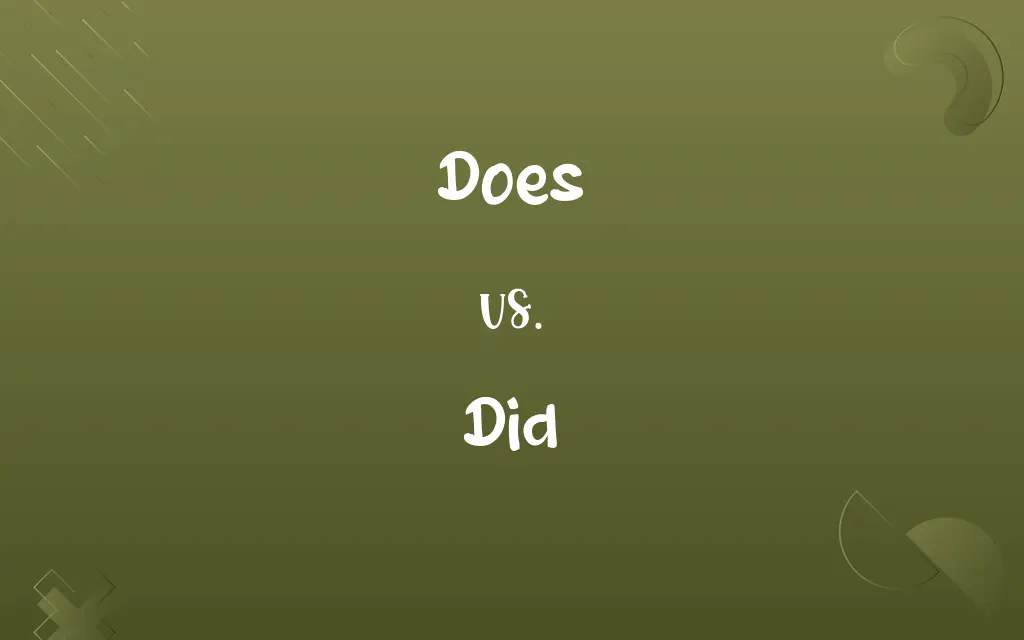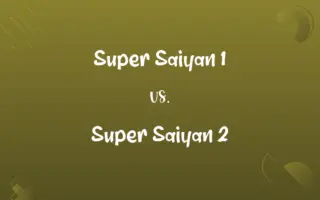Does vs. Did: Know the Difference

By Shumaila Saeed || Published on February 13, 2024
"Does" is the present tense of "do," used for questions and negatives in the present simple tense; "did" is the past tense, used for questions and negatives in the past simple tense.

Key Differences
"Does" is used in the present simple tense for questions and negatives, typically with singular subjects, while "did" is the past simple tense form used for all subjects in questions and negatives.
Shumaila Saeed
Feb 13, 2024
In constructing questions, "does" precedes the subject for present tense queries (e.g., "Does he work here?"), whereas "did" is used similarly but for past tense questions (e.g., "Did he work here?").
Shumaila Saeed
Feb 13, 2024
For negative sentences, "does" is paired with "not" (doesn't) in the present tense, as in "He does not (doesn't) know her." In contrast, "did" is combined with "not" (didn't) for past tense, like in "He did not (didn't) know her."
Shumaila Saeed
Feb 13, 2024
"Does" is also used to emphasize actions in the present tense, such as "He does work hard." On the other hand, "did" can emphasize past actions, as in "He did finish his homework on time."
Shumaila Saeed
Feb 13, 2024
In formal writing, "does" often appears in interrogative and negative structures in the present tense, while "did" is similarly used but for past tense structures.
Shumaila Saeed
Feb 13, 2024
ADVERTISEMENT
Comparison Chart
Usage in Negatives
Combined with "not" for present negatives.
Combined with "not" for past negatives.
Shumaila Saeed
Feb 13, 2024
Subject Agreement
Used with third-person singular subjects.
Used with all subjects.
Shumaila Saeed
Feb 13, 2024
ADVERTISEMENT
Does and Did Definitions
Does
Used for making negatives in the present tense.
She does not understand the question.
Shumaila Saeed
Jan 19, 2024
Does
To emphasize a statement in the present.
He really does know how to cook.
Shumaila Saeed
Jan 19, 2024
ADVERTISEMENT
Does
Used in formal or emphatic speech and writing.
Does the company export its products?
Shumaila Saeed
Jan 19, 2024
Did
Used in formal or emphatic speech and writing in past tense.
Did the team perform well last season?
Shumaila Saeed
Jan 19, 2024
Does
Used in questions for present actions.
Does this train stop at the next station?
Shumaila Saeed
Jan 19, 2024
Repeatedly Asked Queries
What is the basic function of "does"?
"Does" is used as an auxiliary verb in present simple tense questions and negatives.
Shumaila Saeed
Feb 13, 2024
Is "did" used with a specific subject form?
No, "did" can be used with any subject, singular or plural.
Shumaila Saeed
Feb 13, 2024
How is "did" used in sentences?
"Did" is the past tense form of "do," used in questions and negatives in the past simple tense.
Shumaila Saeed
Feb 13, 2024
Can "does" be used with plural nouns?
No, "does" is used with singular third-person subjects.
Shumaila Saeed
Feb 13, 2024
Can "does" be used for emphasis?
Yes, "does" can be used to emphasize a statement in the present tense.
Shumaila Saeed
Feb 13, 2024
How do "does" and "did" affect the main verb?
Both "does" and "did" require the main verb to be in its base form.
Shumaila Saeed
Feb 13, 2024
Can "did" be used for emphasis?
Yes, "did" is used to emphasize a statement in the past tense.
Shumaila Saeed
Feb 13, 2024
Is "did" suitable for formal contexts?
Yes, "did" is used in formal settings, particularly in questions and negatives.
Shumaila Saeed
Feb 13, 2024
What is an example of a question using "does"?
"Does she understand the problem?"
Shumaila Saeed
Feb 13, 2024
What is the negative form of "does"?
The negative form is "does not" or "doesn’t."
Shumaila Saeed
Feb 13, 2024
Is "does" used in formal writing?
Yes, especially in formal interrogative and negative sentences.
Shumaila Saeed
Feb 13, 2024
Is omitting "did" in questions acceptable?
In informal speech, sometimes, but it's not grammatically standard.
Shumaila Saeed
Feb 13, 2024
Are "does" and "did" interchangeable?
No, they are used in different tenses and are not interchangeable.
Shumaila Saeed
Feb 13, 2024
Can "does" be omitted in informal speech?
In informal speech, some may omit "does," but it's grammatically incorrect.
Shumaila Saeed
Feb 13, 2024
Does "did" change the form of the main verb?
No, the main verb stays in its base form after "did."
Shumaila Saeed
Feb 13, 2024
Can "does" be used in all tenses?
No, "does" is specific to the present simple tense.
Shumaila Saeed
Feb 13, 2024
Can "did" be used in present tense?
No, "did" is exclusively used in the past tense.
Shumaila Saeed
Feb 13, 2024
How does "does" affect the main verb's spelling?
The main verb remains in its base form without any changes.
Shumaila Saeed
Feb 13, 2024
Share this page
Link for your blog / website
HTML
Link to share via messenger
About Author
Written by
Shumaila SaeedShumaila Saeed, an expert content creator with 6 years of experience, specializes in distilling complex topics into easily digestible comparisons, shining a light on the nuances that both inform and educate readers with clarity and accuracy.








































































